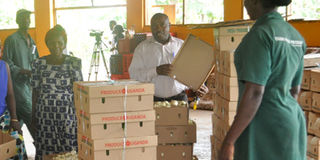fresh produce for export

A trader stands next to a box of eggplants ready for export. File photo
What you need to know:
Having started his company where he grows vegetables for export, one farmer is happy with the proceeds he is making.
James Kanyije graduated in 1996 with a diploma in Business studies from Nakawa Business School. Shortly after his graduation, the 42-year-old was employed as a yield controller with Uganda Fish Packers. But after working with the company for four years, he quit and partnered with some foreigners to start a vegetable and fruit exporting company called Ice mark. In the company, Mr Kanyije owned 10 per cent shares. “I thought I would get more money and peace of mind if I employed myself,” the chatty Kanyije says.
But for reasons he could not divulge, Mr Kanyinje in July this year sold off his shares and quit to start his fruit and vegetable exporting company called KK Fresh Produce Exporters Ltd. With an initial capital of Shs500m and a 100-acre piece of land in Wabikokoma village, Kalagala Sub-county, Luweero District, which he had earlier bought using savings he made from his previous work, Mr Kanyije started off his business.
Because he was not new in the horticulture export business, Mr Kanyije already had customers for his produce in Europe so he didn’t find any difficulties in looking for them. He also turned his four bedroom house in Naalya village into an office and packaging centre.
A farm with different produce
At his farm in Wabikokoma, Mr Kanyije had already planted 10 acres of banana, which plantation he later expanded to 40 acres. To diversify his export business, he also planted four acres of sweet bananas, 10 acres of sweet potatoes, five acres of okra, five acres of eggplant, chili and two acres of karela (bitter melon). “I used the Shs500m to set up an irrigation system on my farm, to construct a packing yard, buy packaging materials and also pay flight costs of my produce to Europe,” he says.
The farmer says every fortnight, he exports 3.6 tonnes of sweet potatoes to London and two tonnes of sweet banana which he sells at £10 (about Shs39,000) for a box of six kilogrammes. He adds that he also exports 500 boxes of eggplant every week to the UK. A six kilogramme box costs £11.50 (Shs 50,600). “Ghana was the main exporter of eggplant to Europe but their produce is now not saleable because of its low quality due to poor soils, pests and diseases that have attacked the vegetable. Because of this, eggplant is now on high demand,” he says.
Mr Kanyije, who employs 40 workers, exports 240 boxes of bananas a week to the UK and sells a box at 14 pounds. “In just five months, my business is worth Shs4bn,” he brags before complaining about government’s failure to intervene and offer funds to them (produce exporters) like other East African countries do. “We bring in a lot of foreign exchange, but government intervention is yet to be seen,” he says.
Mr Kanyije says 70 per cent of the expenses he incurs are freight costs to Europe, which he says affects his business because it’s a direct expense. He also incurs costs buying boxes in which he packs his produce and paying the workers who work in the garden and those who pack the produce and other costs like buying pesticides.
Challenges met
Although his business is flourishing, Mr Kanyije says he faces a number of challenges like lack of coolers for cooling the produce as they wait to export it. This, he says lowers the shelf life and compromises the quality. “Because I lack coolers, I have to pack and immediately export but sometimes I fail and the produce perishes,” he says.
Lack of good seed locally is another challenge which he says has somewhat compromised the quality of his produce for export. He says many of the seeds sold locally are fakes while those from abroad are very expensive. He also says that the poor roads especially in areas where he buys the produce leads to delay in delivering the produce at the packing yard and on the market.
Mr Kanyije is also bitter with the unprincipled businessmen who hide high value goods like cigarettes under the produce for export and in the end sell their produce cheaply on the market because their main target is to smuggle the high value goods from which they get big profits.
“Vegetables for export don’t pay any tax at the point of entry and exit so these people use this to smuggle their goods,” he says. He also says lack of government intervention in controlling pests and diseases, and research has affected his production. Almost 30 per cent of bananas have been wiped by banana wilt disease and Black Sigatoka, he states.
Despite this, Mr Kanyije says the future of his business is bright and wants to double his exports and also expand to Rwanda. “If government intervenes and assists me, I am capable of exporting three times more than I am doing,” he concludes.




